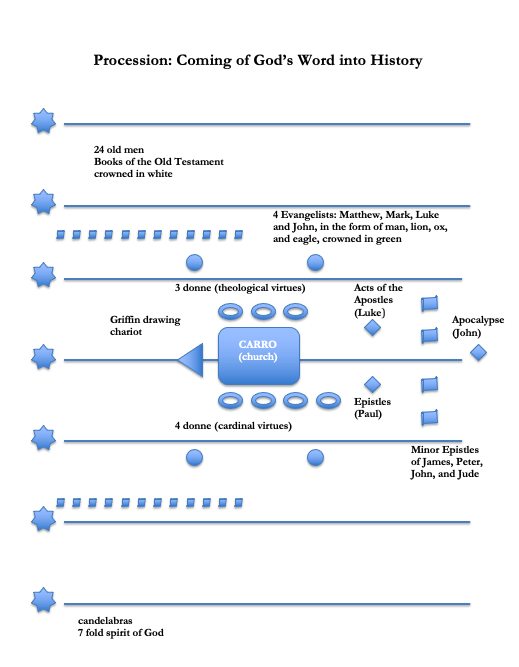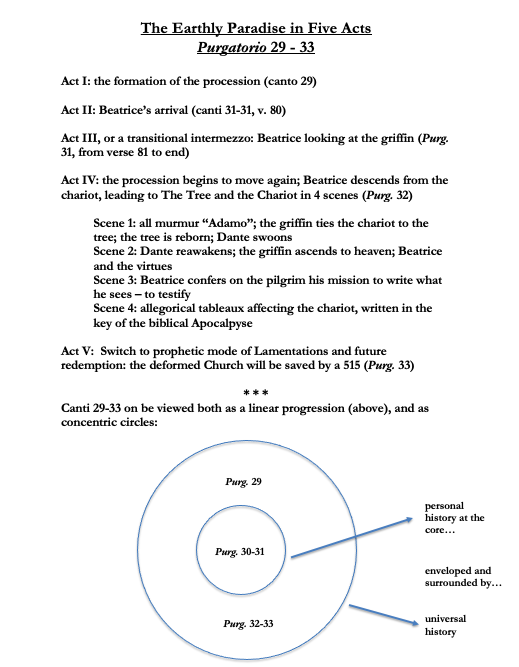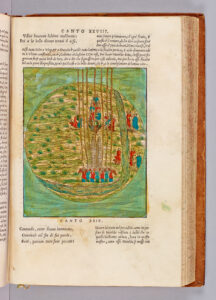In the last pages of Chapter 7 of The Undivine Comedy, “Nonfalse Errors and the True Dreams of the Evangelist,” I treat the events of the Earthly Paradise as a key moment in the Commedia’s exploration of vision as a modality of experience.
We have seen Dante explore poetic genealogies unfolding in time: from their Occitan origins (Arnaut Daniel and Giraut de Bornelh in Purgatorio 26), to the Sicilian School (the “Notaio” Giacomo da Lentini of Purgatorio 24), to the Tuscan school (Bonagiunta da Lucca, Guittone d’Arezzo of Purgatorio 24), to Guinizzelli, the “sweet father” of Purgatorio 26, and finally to Dante himself and the creation of the dolce stil novo (Purgatorio 24). Now Dante designs a visionary genealogy unfolding in time: from the Old Testament prophet and visionary Ezekiel, to the New Testament visionary author of the Apocalpyse, St. John, to Dante himself. Both genealogies, the poetic and the prophetic, conclude with the Divine Comedy.
Purgatorio 29 is a canto devoted to macro-history, in particular to the prophetic genealogy and to the visionary mode. In this canto a procession slowly takes shape, item by item, personage by personage, for the pilgrim’s viewing. Below is an attempt at a schematic diagram of the procession.
A second diagram represents a linear unfolding of the events between Purgatorio 29 and 33, divided into five Acts. As you can see, Purgatorio 29 is the site for Act 1: the formation of the procession.
The first terzina of Purgatorio 29 is one of the great examples of Dante’s remarkable cultural and intertextual hybridity:
Cantando come donna innamorata, continuò col fin di sue parole: ‘Beati quorum tecta sunt peccata!’. (Purg. 29.1-3)
Her words were done, but without interruption she sang — like an enamored woman — thus: “Beati quorum tecta sunt peccata!”
The first verse is an almost verbatim citation of Guido Cavalcanti’s pastorella, a sensuous love poem that is quoted in full in the Commento on Purgatorio 28. The third verse of the tercet is a verbatim quote of the beginning of Psalm 32, “Blessed are those whose sins are covered”, cited in Latin by Dante, here in the King James version: “Blessed is he whose transgression is forgiven, whose sin is covered” (Psalm 32:1). Verse 1 of Purgatorio 29 gestures back toward the delicate sensuality of Purgatorio 28, while verse 3 looks forward to the biblical procession of Purgatorio 29. The Cavalcantian first verse describes the way that Matelda sings — “Cantando come donna innamorata” —, while the biblical third verse constitutes the words of her song.
In effect, Dante has constructed a terzina in which a verse of Cavalcanti is the qualifier to a verse from a Psalm. What better example could there be of the intense plasticity of his mind, his willingness to yoke together different textual worlds to make a new — Dantean — universe?
The affect of the episode shifts sharply, as Matelda becomes teacher rather than lyric lover, and directs Dante to focus on the unfolding of the procession that represents the coming of the word of God into history.
The books of the Bible arrive as embodied figures. Let us unpack this conceit: the conceit whereby the written word of Scripture appears in this procession in the form as embodied men. Here the poet whose default mode of signifying is in imitation of the Bible, which is the only verbal mode of signifying in which the literal level is true, brings the verbal medium of Scripture into his text as embodied figures.
In this way, Dante is telling us that the Bible is the only verbal medium that is literally true. He is telling us that God writes not with signs, but with things — with reality. Scripture is the one text in which the signa are res: the signs are things. And so Dante reproduces the Bible in his text not only as words (there is of course much intertextual presence of the Bible in the Commedia), but as things, as embodied figures. As I write in The Undivine Comedy: “the one text whose verba are in fact res are preserved by him as res in his verba” (p. 155).
The embodied figures who represent the books of the Bible arrive in an orderly historical sequence. First to arrive are twenty-four old men representing the Old Testament. They are followed by an empty chariot, which represents the church, drawn by a griffin, traditionally taken as a representation of Christ. The chariot is surrounded by seven female figures who represent the four cardinal virtues and the three theological virtues, as well as by four creatures who represent the four evangelists.
Behind the chariot are the Acts of the Apostles, the Epistles of Paul, and the minor Epistles of James, Peter, John, and Jude. Bringing up the rear is “un vecchio solo . . . dormendo, con la faccia arguta”: “a lone old man, his features keen, as if in sleep” (Purg. 29.143-44). This is John, the author of the Apocalypse, who is in a visionary trance: in other words, he is “asleep”, yet keenly sighted. (In Dante’s day the author of the Gospel of John and the author of the Apocalypse were held to be the same John; see the Commento on Inferno 19.)
Very important is the passage in which Dante addresses the reader, comparing his task in describing what he saw to the tasks of the biblical prophet-visionaries: Ezekiel (Old Testament) and John (Apocalypse, New Testament). This is the passage where he places himself in a visionary genealogy. Dante refers to the four animals — “quattro animali” (Purg. 29.92) — that traditionally represent the four Gospels, based on a passage in the Apocalypse:
in circuitu sedis quattuor animalia, plena oculis ante et retro, Et animal primum simile leoni, et secundum animal simile vitulo, et tertium animal habens faciem quasi hominis, et quartum animal simile aquilae volanti. Et quattuor animalia, singula eorum habebant alas senas; et in circuitu et intus plena sunt oculis.
In the center, around the throne, were four living creatures, and they were covered with eyes, in front and in back. 7 The first living creature was like a lion, the second was like an ox, the third had a face like a man, the fourth was like a flying eagle.8 Each of the four living creatures had six wings and was covered with eyes all around, even under its wings. (Revelation 4:6-8, New International Version)
The lion is the symbol of St. Mark, the ox is the symbol of St. Luke, the man is the symbol of St. Matthew, and the eagle eagle is the symbol of St. John.
At this point Dante introduces a textual ambiguity, an issue of interpretation respect to the Bible! He explicitly states that he disagrees with Ezekiel as to the number of the wings of the four creatures representing the Gospels. Ezekiel had posited four wings. John, as we can see in the above citation from the Apocalpyse (also called Revelation) posits that each has six wings: “Each of the four living creatures had six wings”.
In an extraordinary metapoetic moment, Dante claims the authority to intervene in a dispute between two prophet-visionaries: Ezekiel of the Old Testament, who claims that the creatures had four wings, and John of the New Testament, who claims that they had six. Dante tells us that he agrees with John on the matter of the wings — or, to be precise, he tells us that “Giovanni è meco e da lui si diparte” (John is with me as to their wings, and disagrees with him [Purg. 29.105]). Thus, it is John who agrees with Dante, rather than the other way around:
Ognuno era pennuto di sei ali; le penne piene d'occhi; e li occhi d'Argo, se fosser vivi, sarebber cotali. A descriver lor forme più non spargo rime, lettor; ch’altra spesa mi strigne, tanto ch’a questa non posso esser largo; ma leggi Ezechiel, che li dipigne come li vide da la fredda parte venir con vento e con nube e con igne; e quali i troverai ne le sue carte, tali eran quivi, salvo ch’a le penne Giovanni è meco e da lui si diparte. (Purg. 29.94-105)
Each had six wings as plumage, and those plumes were full of eyes; they would be very like the eyes of Argus, were his eyes alive. Reader, I am not squandering more rhymes in order to describe their forms; since I must spend elsewhere, I can’t be lavish here; but read Ezekiel, for he has drawn those animals approaching from the north; with wings and cloud and fire, he painted them. And just as you will find them in his pages, such were they here, except that John’s with me as to their wings; with him, John disagrees.
In the above passage, Dante carefully inscribes himself into a prophetic genealogy, as in Inferno 4 he inscribes himself into a poetic genealogy. As I write in The Undivine Comedy:
In this passage Dante instructs us regarding the appearance of the four animals representing the evangelists in the procession: each one has six wings, covered with eyes, as plentiful as the eyes of Argus, whose hundred watchful eyes were enlisted by Juno to guard her rival Io, as recounted by Ovid. Since the poet cannot spare the time to describe (“descriver”) the gospel animals in greater detail, we are to read Ezekiel, who “paints them as he saw them”; in the matter of the number of their wings, however, we are to follow John, the seer who relived Ezekiel’s vision and who agrees with Dante that they have six wings rather than four. The passage presents a visionary genealogy: Dante moves from Ovidian Argus, to an Old Testament prophet, to a prophet of the new dispensation, the author of the text that will appear at canto’s end in visionary posture, as the senex who approaches “dormendo, con la faccia arguta”. (The Undivine Comedy, p. 156)
As noted, the four figures representing the four evangelists surround a triumphal chariot pulled by a griffin; much of what occurs in the later canti of the Earthly Paradise will occur to or around this chariot.
A final note: Dante paved the way for many literary “inventions” that we do not associate with him, because he genially touched on them, without developing them further. For instance, the trope of the “anniversary poem”, which we associate with Petrarch, in fact has its origins in Dante’s Vita Nuova. Similarly, the important Renaissance genre of the “triumph”, which we associate with Boccaccio and Petrarch, has its seminal origin in the procession of Purgatorio 29.


 Return to top
Return to top